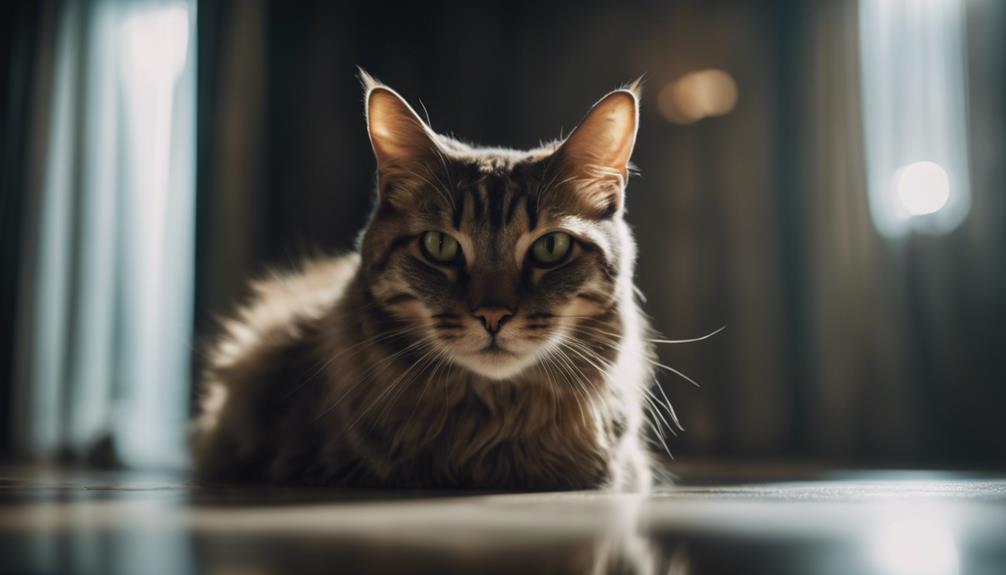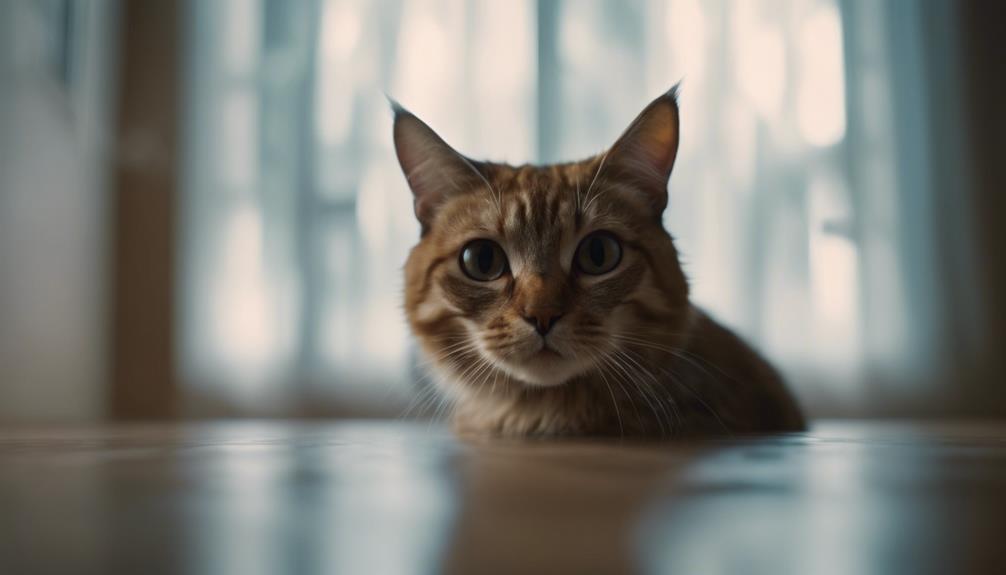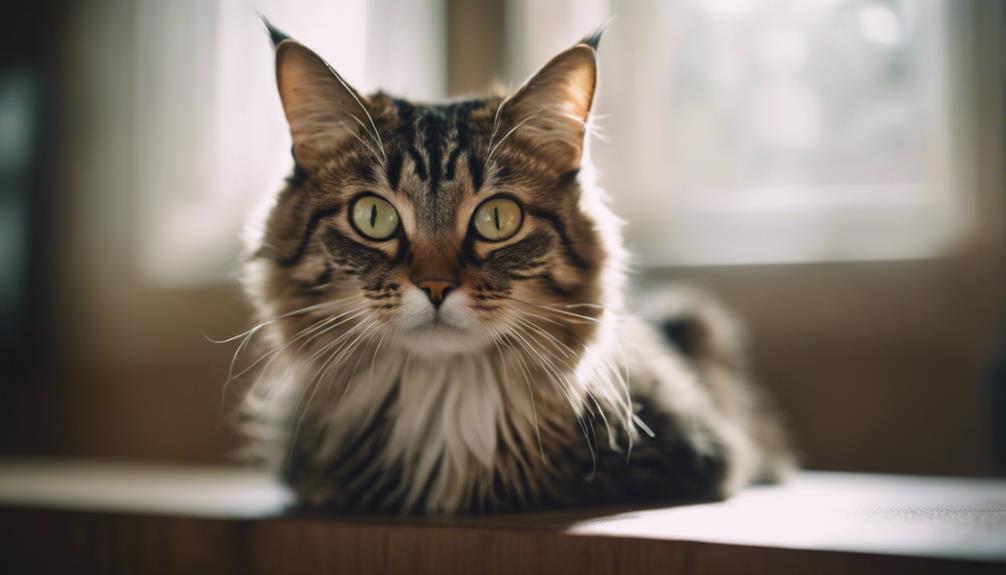Have you ever pondered the possibility of a world unseen by human eyes, a realm where mysterious entities may lurk? Cats, with their enigmatic behaviors and keen senses, often leave us wondering about the extent of their perception.
Could it be that they possess an ability to see beyond our comprehension? Join us as we uncover the intriguing insights shared by a vet and a behavior expert, shedding light on the age-old question: Can Cats See Ghosts?
Key Takeaways
- Cats' heightened senses can lead to behaviors misinterpreted as sensing ghosts.
- Cats' alertness to stimuli and protective instincts may contribute to ghost sightings misconceptions.
- Understanding cats' exceptional senses debunks supernatural beliefs about cats seeing ghosts.
- Cats' behaviors align with their sensory enhancements, often mistaken for interactions with supernatural entities.
Cats' Enhanced Senses
Cats possess highly developed sensory abilities, allowing them to perceive the world in ways far beyond human comprehension. Their exceptional low-light vision, superior to ours by six times, enables them to navigate dim environments effortlessly. With the tapetum lucidum enhancing night vision and the nictitating membrane providing protection and clearer sight, cats excel in the dark.
Their hearing extends to frequencies beyond human capabilities, and their sense of smell surpasses ours by 9–16 times. Whiskers aid in detecting subtle changes in air currents, gauging spatial dimensions, and pinpointing prey locations. Furthermore, cats see on the ultraviolet light spectrum, revealing hidden elements imperceptible to humans.
Their ability to perceive colors differently, prioritizing motion and shape recognition, adds to their sensory prowess.
Myths and Beliefs
Exploring ancient cultures and modern beliefs reveals intriguing connections between cats' mysterious behaviors and supernatural occurrences.
- Cats have been associated with divine energy in ancient Egyptian culture and various folklore stories linking them to mystical occurrences.
- A YouGov poll showed around 45% of people believe in ghosts, often attributing unusual cat behavior to sensing ghosts.
- Cats' reactions to stimuli can be misinterpreted as ghost sightings due to their heightened senses.
- Various cultures have stories linking cats to supernatural events, influencing interpretations of cats' behaviors.
- Cats' behaviors may align with cultural beliefs about spirits and supernatural occurrences.
Scientific Explanations

In light of modern scientific understanding, we can shed light on the mysterious behaviors of cats often attributed to supernatural occurrences. Cats' extraordinary abilities can explain perceived ghost sightings, debunking supernatural beliefs. Understanding cats' senses helps clarify their mysterious aura and behaviors. Cats' behaviors can be explained by their heightened senses and sensory enhancements. Cats' heightened senses contribute to behaviors that may seem supernatural or mysterious.
| Scientific Explanations | |||
|---|---|---|---|
| Cats' abilities debunk supernatural beliefs | |||
| Understanding senses clarifies behaviors | |||
| Heightened senses explain mysterious aura | |||
| Sensory enhancements impact behaviors |
Cats' Behavior Analysis
Upon understanding cats' sensory enhancements and heightened abilities, it becomes evident that their behavior analysis unveils intriguing insights into their interactions with the environment.
- Cats' mysterious aura is influenced by their heightened senses.
- Their alertness to subtle changes can be misinterpreted as ghost sightings.
- Cats' protective instincts may lead to behaviors that seem supernatural.
- Communication through body language and vocalizations can be misunderstood.
- Stress or anxiety can manifest in unusual behaviors, reflecting their evolutionary adaptations.
Reactions to Environmental Stimuli

Our feline companions often react subtly yet distinctly to various environmental stimuli, showcasing their heightened senses and instinctive responses. Cats' acute senses allow them to pick up on subtle changes in their surroundings, often leading to intriguing reactions that may seem mysterious to us. Here is a breakdown of some common environmental stimuli and how cats typically respond:
| Stimulus | Typical Reaction | Explanation |
|---|---|---|
| Sudden noises | Ears perked up, alertness | Cats' excellent hearing helps them detect potential threats. |
| Moving objects | Pouncing or stalking behavior | Cats' predatory instincts drive them to investigate potential prey. |
| Strong scents | Sniffing intensely | Cats rely heavily on their sense of smell to explore and understand their environment. |
Communication and Misinterpretations
Transitioning from reactions to environmental stimuli, we explore how cats communicate and the potential misinterpretations of their behaviors. Cats convey messages through various means, but their subtle cues can sometimes be misunderstood, leading to misconceptions about their intentions. Here are some key points to consider:
- Body language: Cats use their posture, tail position, and facial expressions to communicate their feelings and intentions.
- Vocalizations: Meows, purrs, hisses, and chirps are all forms of communication that can be misinterpreted if not considered in context.
- Personal space: Cats have boundaries and preferences for physical contact, which, if ignored, can lead to misunderstandings.
- Play behavior: Cats' playfulness can sometimes be misconstrued as aggression or fear, affecting how their actions are perceived.
- Environmental responses: Cats may react to changes in their surroundings, displaying behaviors that could be mistakenly associated with supernatural occurrences.
Stress and Anxiety Manifestation

When cats experience stress and anxiety, their behaviors and reactions may provide insight into their emotional well-being. Signs of stress in cats can manifest in various ways, such as excessive grooming, hiding, aggression, or changes in appetite. These behaviors serve as indicators of their mental state and shouldn't be dismissed.
It's crucial to pay attention to these cues and address the underlying causes to ensure the well-being of our feline companions. Creating a safe and comfortable environment, providing mental stimulation, and establishing routines can help alleviate stress in cats. By recognizing and responding to their stress and anxiety, we can help our cats lead happier and healthier lives.
Health Implications
Recognizing and addressing stress and anxiety in cats is crucial for their well-being; now, we'll explore the health implications associated with these emotional states.
- Chronic stress can lead to physical health issues such as gastrointestinal problems and a weakened immune system.
- Persistent anxiety may result in behavioral problems like aggression or destructive behavior.
- High levels of stress can contribute to urinary issues such as feline lower urinary tract disease.
- Anxiety in cats can manifest as overgrooming, leading to skin problems and potential infections.
- Untreated stress and anxiety can impact a cat's overall quality of life and longevity.
Professional Guidance and Support

Seeking professional guidance and support can provide valuable insights into addressing your cat's stress and anxiety effectively. A veterinarian can conduct a thorough physical examination to rule out any underlying medical conditions contributing to your cat's behavior.
Additionally, consulting with a certified animal behaviorist can help identify triggers for stress and provide tailored behavior modification strategies. These experts can offer guidance on creating a calming environment, implementing enriching activities, and establishing routines to alleviate your cat's anxiety.
Conclusion
In conclusion, after delving into the intriguing world of cats and their supposed ability to see ghosts, we've discovered that the truth may lie in their heightened senses and unique behaviors.
While we may never know for sure if cats truly see beyond the veil, one thing is certain – they've a sixth sense that keeps us captivated and mystified.
As the saying goes, the truth is often stranger than fiction, especially when it comes to our enigmatic feline friends.




